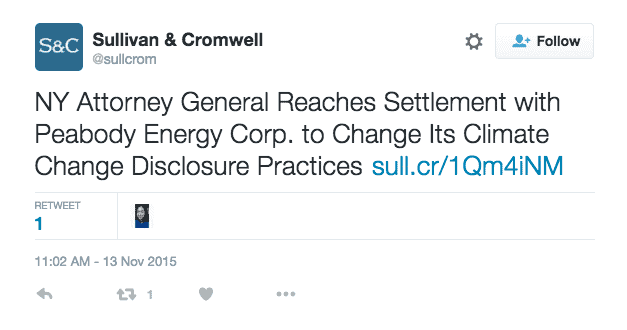Jay Clayton, the SEC, and climate change disclosure

What does Donald Trump’s plan to nominate Jay Clayton as chairman of the Securities and Exchange Commission (SEC) mean for the future of corporate climate change disclosure?
The election of Donald Trump has created real uncertainty about the direction the SEC will take on corporate climate change disclosure over the next four years. At stake is the interpretive guidance on climate change disclosure that the SEC provided to companies in 2010, and the SEC’s related investigation into ExxonMobil.
Donald Trump has yet to weigh on whether or not the SEC will move forward on enforcing its climate change disclosure rules, but the president-elect has said in a statement that many SEC regulations will be on the chopping block.
Clayton’s law firm, Sullivan & Cromwell, has suggested that corporations should adequately disclose their climate change related risks to the SEC and investors, and pointed out the legal scrutiny companies like ExxonMobil and Peabody Energy have faced when they failed to do so. The firm’s take on this issue is rather striking, given that it has represented a host of fossil fuel interests, including ExxonMobil. And of course Clayton is set to join an administration that looks to be chalk full of climate change deniers with ties to fossil fuel interests.
Memos show Jay Clayton’s law firm has suggested that corporations disclose their climate change risks
Sullivan & Cromwell has suggested in publicly available memos that corporations should disclose their climate change related risks to the SEC and investors, and noted the legal risks of failing to do so. The memos name Jay Clayton, along with other Sullivan & Cromwell attorneys, as lawyers to contact with questions on the matter. They do include a typical lawyerly disclaimer not to take the memos as legal advice (which clients would presumably have to pay for).
For example, a 2010 Sullivan & Cromwell memo summarized the SEC’s new interpretive guidance on climate change disclosure, and suggested that corporations “will wish to take these views into account in preparing their Form 10-K’s, annual reports to shareholders and other disclosure documents.” The following is an excerpt from that memo:
The SEC recently published an interpretive release to provide guidance to public companies regarding application of the SEC’s existing disclosure requirements to climate change matters. The SEC is alerting registrants to the increasing importance of climate change-related regulation and the potential effects of that regulation on companies’ operations and financial performance. The release points out specific areas of an annual report (such as the description of business, legal proceedings, risk factors and management’s discussion and analysis) where detailed discussion of impacts of climate change would be appropriate, and reviews topics related to climate change which could trigger disclosure requirements, such as:
Impact of international treaties or accords on businesses, especially for registrants with operations outside the United States that are or will soon become subject to such standards;
Impact of significant developments in federal and state legislation and the difficulties involved in assessing the timing and effect of pending legislation, especially for registrants that are particularly sensitive to greenhouse gas regulation;
Indirect consequences of legal, technological or scientific developments, such as increased demand for goods that results in lower greenhouse gas emissions or reputational damage arising from the public’s perception of greenhouse gas emissions; and
Physical impact of climate change, notably the devastating results of severe weather conditions.
Registrants will wish to take these views into account in preparing their Form 10-K’s, annual reports to shareholders and other disclosure documents.
In 2015, Cromwell & Sullivan published another memo on a recent settlement between Peabody Energy and New York Attorney General Eric Schneiderman, wherein the coal company agreed to stop misleading its investors and start acknowledging climate change risks in its annual SEC disclosures. This memo warned of potential legal consequences for companies – particularly those in fossil fuel industry – that fail to properly disclose their climate risks:
The settlement is the most recent development in a trend towards increased regulatory scrutiny of climate change disclosure by public companies. Reporting companies, particularly those in fossil fuel industries, may wish to review their disclosure practices regarding the possible financial impact of climate change and of proposed laws, regulations and policies aimed at reducing carbon emissions. In particular, companies may wish to consider whether their disclosure takes appropriate account of internal analyses or projections, as well as analyses or projections prepared by consultants, that may have been prepared regarding the potential financial impact of these matters. Although the settlement is unusual for its detailed focus on a single company’s public disclosure, the Martin Act gives the NY AG extremely broad subpoena authority to investigate publicly traded companies for misleading disclosure practices. The NY AG’s office recently confirmed that it is investigating claims that ExxonMobil suppressed climate change research and misled its investors about the potential financial impact of climate change, and has issued a subpoena demanding extensive financial records, emails and other documents. Published reports suggest that the Exxon investigation may be expanded to encompass other fossil fuel companies.
Whether the SEC will also take a more aggressive approach to policing climate change-related disclosure remains to be seen. In 2010, the SEC issued guidance to public companies clarifying situations in which disclosure of risks related to climate change might be required, and the agency has received calls, including from members of Congress, to strengthen its enforcement efforts in this area.

That was before news broke in 2016 of the SEC’s investigation into ExxonMobil, an announcement which marked a bold departure from the SEC’s previously lax enforcement of its corporate climate change disclosure rules.
The Sullivan & Cromwell memos also serve as a reminder that state attorneys general will undoubtedly continue with their efforts to hold fossil fuel and utility interests accountable on climate change, regardless of what direction the SEC takes on the issue moving forward. By 2008 and 2009, the office of the New York attorney general had reached settlements with several electric utilities – AES Corporation, Dynegy Inc, and Xcel Energy – that, as Sullivan & Cromwell noted in its 2010 memo, “agreed to enhance their disclosures relating to climate change and greenhouse gas emissions in their annual reports filed with the SEC.” Attorneys general in states like California, Massachusetts, and New York will also move forward with their investigations into ExxonMobil’s tobacco-style efforts to mislead investors and the public about the risks of climate change.

Furthermore, Sullivan & Cromwell have explained that, “The SEC also indicates that there have been increasing requests for climate-related disclosures by shareholders of public companies.” Analysis by the law firm confirmed that corporate shareholder proposals aimed at addressing environmental issues were common in 2016, a trend that will continue to keep the pressure on fossil fuel interests like Chevron and ExxonMobil during the Trump years – and make it hard for the SEC to avoid addressing the issue.
One of Jay Clayton’s fossil fuel clients disclosed some climate risks to the SEC
One of Jay Clayton’s clients appears to have followed the firm’s advice (and at least some of the SEC’s guidance) on climate change disclosure. Clayton represented Crude Carrier Corp. during its Initial Public Offering (IPO) of stock, according to his biography on Sullivan & Cromwell’s website. Clayton’s name appeared on page one the company’s March 2010 IPO filing with the SEC, which was dated about a month after Sullivan & Cromwell published its memo and the SEC’s climate disclosure rule went into effect.
Crude Carrier Corp.’s IPO filing included the following disclosure of risks related to climate change policies:
In February 2005, the Kyoto Protocol to the United Nations Framework Convention on Climate Change (the “Kyoto Protocol”) entered into force. Pursuant to the Kyoto Protocol, adopting countries are required to implement national programs to reduce emissions of certain gases, generally referred to as greenhouse gases. Currently, the emissions of greenhouse gases from international shipping are not subject to the Kyoto Protocol. However, a new treaty may be adopted in the future that includes restrictions on shipping emissions. The European Union has indicated that it intends to propose an expansion of the existing European Union emissions trading scheme to include emissions of greenhouse gases from marine vessels. In the United States, the EPA has issued a proposed finding that greenhouse gases threaten public health and safety and is considering a petition from the California Attorney General to regulate greenhouse gas emissions from ocean-going vessels. Other federal regulations relating to the control of greenhouse gas emissions may follow. In addition, climate change initiatives are being considered in the U.S. Congress. Any passage of climate control legislation or other regulatory initiatives by the IMO, EU, the United States or other countries where we operate that restrict emissions of greenhouse gases could require us to make significant financial expenditures that we cannot predict with certainty at this time or otherwise limit our operations.
What’s next for climate change disclosure?
For now, it remains unclear what course the SEC will take on climate change disclosure under the Trump administration, and whether Clayton will choose to apply his own law firm’s sound advice on corporate climate change disclosure in his new role as SEC chairman.
What is clear that state attorneys general and shareholders will continue to push for proper disclosure of climate change risks by fossil fuel and utility companies, in order to protect investors and the broader public from being deceived.



